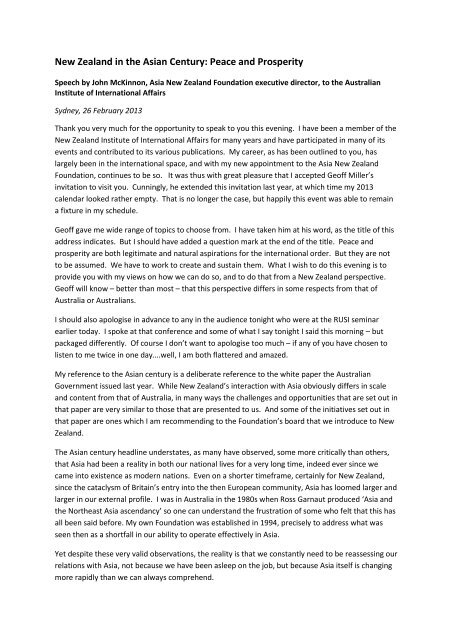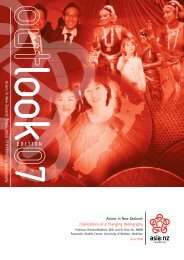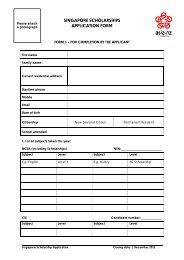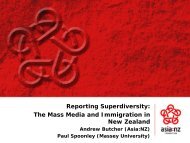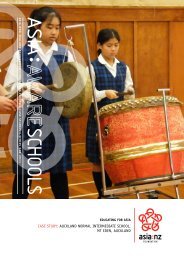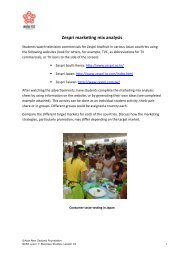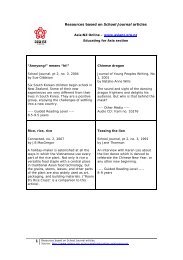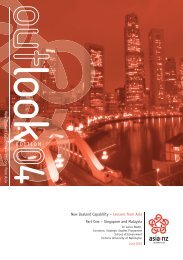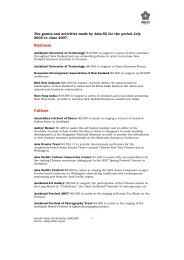New Zealand in the Asian Century: Peace and Prosperity - Asia New ...
New Zealand in the Asian Century: Peace and Prosperity - Asia New ...
New Zealand in the Asian Century: Peace and Prosperity - Asia New ...
You also want an ePaper? Increase the reach of your titles
YUMPU automatically turns print PDFs into web optimized ePapers that Google loves.
<strong>New</strong> <strong>Zeal<strong>and</strong></strong> <strong>in</strong> <strong>the</strong> <strong><strong>Asia</strong>n</strong> <strong>Century</strong>: <strong>Peace</strong> <strong>and</strong> <strong>Prosperity</strong><br />
Speech by John McK<strong>in</strong>non, <strong>Asia</strong> <strong>New</strong> <strong>Zeal<strong>and</strong></strong> Foundation executive director, to <strong>the</strong> Australian<br />
Institute of International Affairs<br />
Sydney, 26 February 2013<br />
Thank you very much for <strong>the</strong> opportunity to speak to you this even<strong>in</strong>g. I have been a member of <strong>the</strong><br />
<strong>New</strong> <strong>Zeal<strong>and</strong></strong> Institute of International Affairs for many years <strong>and</strong> have participated <strong>in</strong> many of its<br />
events <strong>and</strong> contributed to its various publications. My career, as has been outl<strong>in</strong>ed to you, has<br />
largely been <strong>in</strong> <strong>the</strong> <strong>in</strong>ternational space, <strong>and</strong> with my new appo<strong>in</strong>tment to <strong>the</strong> <strong>Asia</strong> <strong>New</strong> <strong>Zeal<strong>and</strong></strong><br />
Foundation, cont<strong>in</strong>ues to be so. It was thus with great pleasure that I accepted Geoff Miller’s<br />
<strong>in</strong>vitation to visit you. Cunn<strong>in</strong>gly, he extended this <strong>in</strong>vitation last year, at which time my 2013<br />
calendar looked ra<strong>the</strong>r empty. That is no longer <strong>the</strong> case, but happily this event was able to rema<strong>in</strong><br />
a fixture <strong>in</strong> my schedule.<br />
Geoff gave me wide range of topics to choose from. I have taken him at his word, as <strong>the</strong> title of this<br />
address <strong>in</strong>dicates. But I should have added a question mark at <strong>the</strong> end of <strong>the</strong> title. <strong>Peace</strong> <strong>and</strong><br />
prosperity are both legitimate <strong>and</strong> natural aspirations for <strong>the</strong> <strong>in</strong>ternational order. But <strong>the</strong>y are not<br />
to be assumed. We have to work to create <strong>and</strong> susta<strong>in</strong> <strong>the</strong>m. What I wish to do this even<strong>in</strong>g is to<br />
provide you with my views on how we can do so, <strong>and</strong> to do that from a <strong>New</strong> <strong>Zeal<strong>and</strong></strong> perspective.<br />
Geoff will know – better than most – that this perspective differs <strong>in</strong> some respects from that of<br />
Australia or Australians.<br />
I should also apologise <strong>in</strong> advance to any <strong>in</strong> <strong>the</strong> audience tonight who were at <strong>the</strong> RUSI sem<strong>in</strong>ar<br />
earlier today. I spoke at that conference <strong>and</strong> some of what I say tonight I said this morn<strong>in</strong>g – but<br />
packaged differently. Of course I don’t want to apologise too much – if any of you have chosen to<br />
listen to me twice <strong>in</strong> one day….well, I am both flattered <strong>and</strong> amazed.<br />
My reference to <strong>the</strong> <strong><strong>Asia</strong>n</strong> century is a deliberate reference to <strong>the</strong> white paper <strong>the</strong> Australian<br />
Government issued last year. While <strong>New</strong> <strong>Zeal<strong>and</strong></strong>’s <strong>in</strong>teraction with <strong>Asia</strong> obviously differs <strong>in</strong> scale<br />
<strong>and</strong> content from that of Australia, <strong>in</strong> many ways <strong>the</strong> challenges <strong>and</strong> opportunities that are set out <strong>in</strong><br />
that paper are very similar to those that are presented to us. And some of <strong>the</strong> <strong>in</strong>itiatives set out <strong>in</strong><br />
that paper are ones which I am recommend<strong>in</strong>g to <strong>the</strong> Foundation’s board that we <strong>in</strong>troduce to <strong>New</strong><br />
<strong>Zeal<strong>and</strong></strong>.<br />
The <strong><strong>Asia</strong>n</strong> century headl<strong>in</strong>e understates, as many have observed, some more critically than o<strong>the</strong>rs,<br />
that <strong>Asia</strong> had been a reality <strong>in</strong> both our national lives for a very long time, <strong>in</strong>deed ever s<strong>in</strong>ce we<br />
came <strong>in</strong>to existence as modern nations. Even on a shorter timeframe, certa<strong>in</strong>ly for <strong>New</strong> <strong>Zeal<strong>and</strong></strong>,<br />
s<strong>in</strong>ce <strong>the</strong> cataclysm of Brita<strong>in</strong>’s entry <strong>in</strong>to <strong>the</strong> <strong>the</strong>n European community, <strong>Asia</strong> has loomed larger <strong>and</strong><br />
larger <strong>in</strong> our external profile. I was <strong>in</strong> Australia <strong>in</strong> <strong>the</strong> 1980s when Ross Garnaut produced ‘<strong>Asia</strong> <strong>and</strong><br />
<strong>the</strong> Nor<strong>the</strong>ast <strong>Asia</strong> ascendancy’ so one can underst<strong>and</strong> <strong>the</strong> frustration of some who felt that this has<br />
all been said before. My own Foundation was established <strong>in</strong> 1994, precisely to address what was<br />
seen <strong>the</strong>n as a shortfall <strong>in</strong> our ability to operate effectively <strong>in</strong> <strong>Asia</strong>.<br />
Yet despite <strong>the</strong>se very valid observations, <strong>the</strong> reality is that we constantly need to be reassess<strong>in</strong>g our<br />
relations with <strong>Asia</strong>, not because we have been asleep on <strong>the</strong> job, but because <strong>Asia</strong> itself is chang<strong>in</strong>g<br />
more rapidly than we can always comprehend.
That change is comprehensive, but let me identify three critical components of it.<br />
1. <strong>Asia</strong> is gett<strong>in</strong>g richer, <strong>and</strong> gett<strong>in</strong>g richer faster. The statistics for this are legion. Let me just<br />
pull out two:<br />
o<br />
o<br />
The economic transformation <strong>in</strong> India <strong>and</strong> Ch<strong>in</strong>a is happen<strong>in</strong>g at a scale <strong>and</strong> pace<br />
unprecedented <strong>in</strong> history. Average <strong>in</strong>comes are grow<strong>in</strong>g at 10 times <strong>the</strong> pace <strong>and</strong><br />
on more than 200 times <strong>the</strong> scale of <strong>the</strong>ir <strong>in</strong>crease dur<strong>in</strong>g Brita<strong>in</strong>’s <strong>in</strong>dustrial<br />
revolution.<br />
That revolution is not conf<strong>in</strong>ed to those two giants. For example, <strong>the</strong> proportion of<br />
Indonesians liv<strong>in</strong>g <strong>in</strong> urban areas, a proxy for <strong>in</strong>dustrialisation, could reach 71% <strong>in</strong><br />
2030, up from 53% today.<br />
Australia has been hold<strong>in</strong>g its own better than <strong>New</strong> <strong>Zeal<strong>and</strong></strong>, but for both us <strong>the</strong>re has been<br />
a huge change <strong>in</strong> our relative position <strong>in</strong> world rank<strong>in</strong>gs of wealth s<strong>in</strong>ce certa<strong>in</strong>ly my younger<br />
days.<br />
2. <strong>Asia</strong> is gett<strong>in</strong>g more powerful, not just Ch<strong>in</strong>a <strong>and</strong> India, but all countries with <strong>in</strong>creased<br />
wealth are devot<strong>in</strong>g part of that to build<strong>in</strong>g up <strong>the</strong>ir military capabilities. It is natural this is<br />
so, but it is chang<strong>in</strong>g not only <strong>the</strong> global balance of power, but <strong>the</strong> balance of power with<strong>in</strong><br />
<strong>the</strong> region.<br />
3. The pr<strong>in</strong>cipal beneficiaries of <strong>the</strong>se changes are <strong>the</strong> educated, prosperous members of<br />
society who now have <strong>the</strong> wherewithal to th<strong>in</strong>k <strong>and</strong> live <strong>in</strong> ways which we conventionally<br />
call ‘middle class’. Even if <strong>the</strong>y are only a portion of <strong>the</strong> total national population, <strong>the</strong><br />
absolute numbers, by our st<strong>and</strong>ards, are stagger<strong>in</strong>g.<br />
The reason I want to highlight those three aspects of <strong>the</strong> rise of <strong>Asia</strong> is that we have to keep all three<br />
<strong>in</strong> <strong>the</strong> picture if we are to make an accurate assessment of what our future with <strong>Asia</strong> will be. We<br />
could depict <strong>the</strong>m as a triangle because <strong>the</strong>y all relate to <strong>and</strong> re<strong>in</strong>force one ano<strong>the</strong>r, while at <strong>the</strong><br />
same time <strong>the</strong>y are set at different angles.<br />
<br />
<br />
Wealth is a necessity for power <strong>and</strong> power enables a country to protect wealth. The<br />
relationship between <strong>the</strong> two has been a staple of <strong><strong>Asia</strong>n</strong> philosophy s<strong>in</strong>ce <strong>the</strong><br />
earliest records. It features <strong>in</strong> Sunzi’s Art of War <strong>and</strong> was recycled by Japanese <strong>and</strong><br />
Ch<strong>in</strong>ese th<strong>in</strong>kers <strong>in</strong> <strong>the</strong> 19 th century. ‘Rich country, strong army’ is one such<br />
formulation <strong>and</strong> <strong>the</strong>re are equivalents <strong>in</strong> o<strong>the</strong>r cultures. This concept is probably<br />
more readily comprehended <strong>in</strong> this country than <strong>in</strong> m<strong>in</strong>e, but it is absolutely vital<br />
that we do grasp its significance. For all <strong>the</strong> countries of <strong>Asia</strong>, whatever <strong>the</strong>ir<br />
history, <strong>in</strong>creased wealth is both an end <strong>in</strong> itself but also a means to assure <strong>and</strong><br />
enhance national power.<br />
These dimensions <strong>the</strong>n <strong>in</strong>tersect with <strong>the</strong> third. The emerg<strong>in</strong>g ‘middle classes’ <strong>in</strong><br />
<strong>the</strong>ir aspirations for <strong>the</strong>ir children, <strong>in</strong> <strong>the</strong>ir <strong>in</strong>terest <strong>in</strong> overseas travel, <strong>in</strong> <strong>the</strong>ir<br />
consumption patterns, <strong>and</strong> <strong>the</strong>ir lifestyles, are ‘more like us’. They are also, judg<strong>in</strong>g<br />
by my own experience, very committed to <strong>the</strong>ir respective national projects.
Nationalism is alive <strong>and</strong> well <strong>in</strong> <strong>Asia</strong>, <strong>and</strong> as with most human phenomena, this has<br />
both a positive <strong>and</strong> a negative charge.<br />
So, <strong>in</strong> sum, we have a region on our doorstep which is grow<strong>in</strong>g more like us <strong>in</strong> some ways, with all<br />
<strong>the</strong> benefits that that br<strong>in</strong>gs <strong>in</strong> terms of exchanges of goods <strong>and</strong> services, people-to-people<br />
<strong>in</strong>teractions, at <strong>the</strong> same time as it is creat<strong>in</strong>g its own modes of modernity. Modernisation, we have<br />
realised, if we had not already apprehended that through our knowledge of Japan, does not equate<br />
to Westernisation.<br />
This is <strong>the</strong> world <strong>in</strong> which we are navigat<strong>in</strong>g. Everybody <strong>in</strong> our world wants peace <strong>and</strong> prosperity.<br />
Can we susta<strong>in</strong> or atta<strong>in</strong> <strong>the</strong>se toge<strong>the</strong>r, ra<strong>the</strong>r than through zero sum games?<br />
<strong>Prosperity</strong> is <strong>the</strong> easier nut to crack, because <strong>in</strong>herently <strong>the</strong> creation of wealth provides more<br />
options. Put very simply, <strong>in</strong> <strong>New</strong> <strong>Zeal<strong>and</strong></strong>, <strong>and</strong> here <strong>in</strong> Australia, we benefit very directly from <strong>Asia</strong>’s<br />
prosperity. Ever s<strong>in</strong>ce that cataclysmic event I referred to, a major <strong>the</strong>me of <strong>New</strong> <strong>Zeal<strong>and</strong></strong>’s external<br />
policy has been to extend <strong>and</strong> deepen our economic <strong>in</strong>teractions with key global markets. In this we<br />
have been successful, if one simply compares <strong>the</strong> diversity of our trade patterns now with that <strong>in</strong> <strong>the</strong><br />
early 1970s.<br />
With<strong>in</strong> that framework <strong>Asia</strong> has taken an <strong>in</strong>creas<strong>in</strong>gly vital role. For <strong>New</strong> <strong>Zeal<strong>and</strong></strong> this change has<br />
been very significant. Dur<strong>in</strong>g <strong>the</strong> time when I was assigned to Ch<strong>in</strong>a, 2001 to 2004, Ch<strong>in</strong>a was our<br />
fourth or fifth-largest trad<strong>in</strong>g partner (<strong>the</strong> o<strong>the</strong>rs be<strong>in</strong>g Japan, <strong>the</strong> US <strong>and</strong> Australia). In 2012, Ch<strong>in</strong>a<br />
is our second-largest trad<strong>in</strong>g partner (Australia is still first) <strong>and</strong> amongst our o<strong>the</strong>r lead<strong>in</strong>g partners<br />
six of eight are <strong>in</strong> <strong>Asia</strong>, <strong>and</strong> all are <strong>in</strong> APEC except <strong>the</strong> UK. This is a seismic change <strong>and</strong> on current<br />
projections those patterns which are now set are likely to cont<strong>in</strong>ue for <strong>the</strong> forseeable future. This<br />
pattern is reflected <strong>in</strong> tourists, students <strong>and</strong> immigrants, although not <strong>in</strong> <strong>in</strong>vestment, <strong>the</strong> stock of<br />
which is still dom<strong>in</strong>ated by what we call our traditional partners.<br />
We have a variety of free trade l<strong>in</strong>kages with <strong>Asia</strong>, <strong>in</strong>clud<strong>in</strong>g bilateral agreements with Ch<strong>in</strong>a,<br />
S<strong>in</strong>gapore, Thail<strong>and</strong>, Malaysia <strong>and</strong> Hong Kong; <strong>and</strong> plurilateral agreements with ASEAN (with<br />
Australia as a partner), <strong>and</strong> with Brunei. On <strong>the</strong> horizon is <strong>the</strong> Trans-Pacific Partnership (TPP) <strong>and</strong><br />
<strong>the</strong> various <strong>in</strong>itiatives tak<strong>in</strong>g place under <strong>the</strong> umbrella of <strong>the</strong> EAS. It would be reasonable to say that<br />
without growth <strong>in</strong> Ch<strong>in</strong>a <strong>and</strong> Australia <strong>the</strong> <strong>New</strong> <strong>Zeal<strong>and</strong></strong> economy would have had a much more<br />
difficult time of it. And leav<strong>in</strong>g aside <strong>the</strong> particularities of <strong>the</strong> global f<strong>in</strong>ancial crisis, on any<br />
reasonable projection, <strong>the</strong> <strong><strong>Asia</strong>n</strong> economies will proportionately <strong>and</strong> absolutely play a larger <strong>and</strong><br />
larger part <strong>in</strong> our lives.<br />
But <strong>the</strong>y will not be alone. One of <strong>the</strong> features of <strong>the</strong> world, which can sometimes get lost as we fix<br />
our gaze on <strong>the</strong> region to our north or northwest, is that o<strong>the</strong>r parts of what was <strong>the</strong> develop<strong>in</strong>g<br />
world are gett<strong>in</strong>g richer too. In particular Africa, which for so long seemed to be bypassed by <strong>the</strong><br />
strong currents of economic growth, is now enter<strong>in</strong>g <strong>the</strong> fray <strong>and</strong> some of its countries are now<br />
follow<strong>in</strong>g <strong>the</strong> path of o<strong>the</strong>r emerg<strong>in</strong>g economies. That is good news. We have many eggs <strong>in</strong> <strong>the</strong><br />
<strong><strong>Asia</strong>n</strong> basket, <strong>and</strong> some very large eggs amongst <strong>the</strong>m, but <strong>the</strong>re are o<strong>the</strong>r baskets.<br />
On <strong>the</strong> o<strong>the</strong>r side of <strong>the</strong> ledger, what is happen<strong>in</strong>g <strong>in</strong> <strong>Asia</strong> is of as much <strong>in</strong>terest <strong>in</strong> Europe <strong>and</strong> North<br />
America as it is to you <strong>and</strong> us. The Trans-Pacific Partnership negotiations <strong>and</strong> APEC before that<br />
reflect that level of <strong>in</strong>terest from <strong>the</strong> United States, <strong>and</strong> now Canada. The ra<strong>the</strong>r unwieldy <strong>Asia</strong>-
Europe Meet<strong>in</strong>g (ASEM), to which we both now belong, reflects a similar impetus from Europe.<br />
There is ano<strong>the</strong>r group<strong>in</strong>g which l<strong>in</strong>ks <strong>Asia</strong> <strong>and</strong> Lat<strong>in</strong> America.<br />
Many of <strong>the</strong>se group<strong>in</strong>gs are aspirational, but <strong>the</strong>y manifest an important po<strong>in</strong>t, that today’s<br />
regionalism by <strong>and</strong> large is open, not closed. This is excellent news for <strong>New</strong> <strong>Zeal<strong>and</strong></strong>. We are<br />
regionalism’s outsiders <strong>and</strong> st<strong>and</strong> to suffer if any part of <strong>the</strong> world turns <strong>in</strong> on itself. It is also a<br />
reflection of <strong>the</strong> more banal po<strong>in</strong>t, that so many issues <strong>in</strong> <strong>the</strong> 21 st century, whe<strong>the</strong>r climate change<br />
or human traffick<strong>in</strong>g, can only be resolved globally, not regionally.<br />
The o<strong>the</strong>r conclusion to draw is that we do not have <strong>the</strong> <strong>Asia</strong>-Pacific region to ourselves. I was much<br />
struck by a reference <strong>in</strong> <strong>the</strong> <strong><strong>Asia</strong>n</strong> century white paper that a m<strong>in</strong>ister of education <strong>in</strong> Sweden<br />
suggested a year or two back that all Swedish school students should learn Ch<strong>in</strong>ese – <strong>in</strong> addition, of<br />
course to Swedish, English <strong>and</strong> French or Spanish. We are not <strong>the</strong> only developed countries seek<strong>in</strong>g<br />
to ride <strong>the</strong> wave of <strong><strong>Asia</strong>n</strong> prosperity.<br />
But <strong>the</strong> messages are largely positive. And beyond that, we have goods, services, environments,<br />
ways of liv<strong>in</strong>g which <strong>in</strong>creas<strong>in</strong>g numbers of our neighbours to <strong>the</strong> north f<strong>in</strong>d attractive <strong>and</strong> wish to<br />
enjoy. We are <strong>in</strong>novative <strong>and</strong> creative. Our societies are, aga<strong>in</strong> by <strong>and</strong> large, open <strong>and</strong> welcom<strong>in</strong>g<br />
to peoples from all over <strong>the</strong> world, whe<strong>the</strong>r as tourists, students, <strong>in</strong>vestors or immigrants. The<br />
English language <strong>and</strong> <strong>the</strong> transparent <strong>and</strong> accountable rule of law are huge <strong>and</strong> important assets.<br />
The diversity of <strong>the</strong> pr<strong>in</strong>cipal cities of Australasia is probably almost unprecedented, <strong>and</strong> yet our<br />
social cohesion rema<strong>in</strong>s strong.<br />
As I <strong>in</strong>dicated earlier, when we turn to <strong>the</strong> geopolitical order, we are faced with a different set of<br />
circumstances. I’m an historian by <strong>in</strong>cl<strong>in</strong>ation so forgive me if I turn <strong>the</strong> clock back at this po<strong>in</strong>t, but<br />
not too far back, really only <strong>the</strong> length of my lifetime, <strong>and</strong> that I suspect of most people <strong>in</strong> this room.<br />
Despite what happened <strong>in</strong> S<strong>in</strong>gapore <strong>in</strong> 1942, we emerged as amongst <strong>the</strong> groups of victors <strong>in</strong><br />
World War II.<br />
The aftermath of that war, if not quite a restoration on <strong>the</strong> scale of <strong>the</strong> Congress of Vienna, did<br />
represent a return for us ra<strong>the</strong>r than a new beg<strong>in</strong>n<strong>in</strong>g. It was <strong>the</strong> exact opposite for most of our<br />
nor<strong>the</strong>rn neighbours. Independence for India, Sri Lanka, Myanmar <strong>and</strong> Indonesia, a new <strong>and</strong> divisive<br />
beg<strong>in</strong>n<strong>in</strong>g for Ch<strong>in</strong>a, rehabilitation for Japan, partition of Korea – all of <strong>the</strong>se took place <strong>in</strong> <strong>the</strong> first<br />
six years after <strong>the</strong> end of World War II. These are ancient civilisations but new states. In comparison,<br />
although we may not th<strong>in</strong>k of it much like that, while our societies are new, politically we are old.<br />
The <strong>New</strong> <strong>Zeal<strong>and</strong></strong> Parliament first met <strong>in</strong> 1854 <strong>and</strong> has had an un<strong>in</strong>terrupted history ever s<strong>in</strong>ce.<br />
It is thus not surpris<strong>in</strong>g that some of <strong>the</strong> perspectives that we have differ from <strong>Asia</strong> <strong>and</strong> that this can<br />
represent a policy challenge. When we were writ<strong>in</strong>g our 2010 defence white paper, some parts<br />
were relatively easy.<br />
We knew what to say about <strong>the</strong> national defence of <strong>New</strong> <strong>Zeal<strong>and</strong></strong> – it did not differ from what we<br />
had said <strong>in</strong> many previous similar documents over several decades. We could not identify any direct<br />
threat to <strong>New</strong> <strong>Zeal<strong>and</strong></strong>’s sovereignty but <strong>the</strong>re were a variety of ways <strong>in</strong> which encroachments could<br />
take place, such as <strong>in</strong> our maritime doma<strong>in</strong> or through cyber space. The capabilities, military <strong>and</strong><br />
o<strong>the</strong>r, we needed to deal with <strong>the</strong>se are more of <strong>the</strong> same.
We also had clear precedents for how <strong>New</strong> <strong>Zeal<strong>and</strong></strong> contributed to <strong>in</strong>ternational forces <strong>in</strong> far-flung<br />
parts of <strong>the</strong> world. We had been do<strong>in</strong>g that for most of <strong>the</strong> 20 th century, <strong>and</strong> could readily forecast<br />
that <strong>the</strong>re would be fur<strong>the</strong>r such calls on our highly professional armed forces <strong>in</strong> <strong>the</strong> decades to<br />
come, even if we could not p<strong>in</strong>po<strong>in</strong>t when or where.<br />
There was also plenty of precedent for how we would support our South Pacific neighbours. The<br />
<strong>in</strong>terventions <strong>in</strong> Timor <strong>in</strong> 1999, Solomons <strong>in</strong> 2004 <strong>and</strong> Tonga <strong>in</strong> 2006 gave us ample material <strong>and</strong> –<br />
more than just by <strong>the</strong> way – some confidence from recent developments that such <strong>in</strong>terventions can<br />
be successful.<br />
But <strong>the</strong> larger <strong>Asia</strong>-Pacific region was more of a conundrum. This is a region of immense importance<br />
to <strong>New</strong> <strong>Zeal<strong>and</strong></strong>, as I have already outl<strong>in</strong>ed, <strong>in</strong>creas<strong>in</strong>gly <strong>the</strong> major source of our wealth <strong>and</strong><br />
prosperity. Yet it would be draw<strong>in</strong>g a very long bow to suggest that what was happen<strong>in</strong>g <strong>in</strong> <strong>the</strong><br />
region represented a direct threat to <strong>New</strong> <strong>Zeal<strong>and</strong></strong>. This simply would not be credible to our people.<br />
Equally <strong>the</strong> <strong>Asia</strong> of today is not a <strong>the</strong>atre <strong>in</strong> which <strong>the</strong>re would be much call for <strong>New</strong> <strong>Zeal<strong>and</strong></strong> forces<br />
to engage <strong>in</strong> <strong>the</strong> expeditionary assistance that has been such a strong feature of our military history<br />
(<strong>and</strong> yours), <strong>in</strong>clud<strong>in</strong>g <strong>in</strong> <strong>Asia</strong> <strong>in</strong> <strong>the</strong> 1950s <strong>and</strong> 1960s. <strong>Asia</strong> is now a region of strong states, not weak<br />
states, states which are more than able to look after <strong>the</strong>ir <strong>in</strong>ternal <strong>and</strong> <strong>in</strong> most cases external<br />
security, states which are us<strong>in</strong>g <strong>the</strong>ir economic wealth to reposition <strong>the</strong>mselves <strong>in</strong> <strong>the</strong> region <strong>and</strong><br />
<strong>the</strong> world.<br />
Yet at <strong>the</strong> same time we did not, <strong>and</strong> decided we should not, st<strong>and</strong> aside from <strong>the</strong> security<br />
challenges of <strong>the</strong> region. Quite apart from our cont<strong>in</strong>u<strong>in</strong>g relationship through <strong>the</strong> Five Power<br />
Defence Arrangements (FPDA) with Malaysia <strong>and</strong> S<strong>in</strong>gapore, we had a very direct <strong>in</strong>terest <strong>in</strong> a region<br />
which was not only prosperous but also peaceful <strong>and</strong> stable. This is not just because an unstable<br />
region would disrupt trade flows <strong>and</strong> thus affect our economic wellbe<strong>in</strong>g, although that is important.<br />
At a more fundamental level, tension <strong>and</strong> conflict challenge <strong>the</strong> very premises on which our world<br />
operates, <strong>the</strong>y are symptoms of illness <strong>in</strong> <strong>the</strong> global body politic. We cannot ignore <strong>the</strong>m. As a<br />
responsible member of <strong>the</strong> regional <strong>and</strong> <strong>in</strong>ternational community of states, we see ourselves as<br />
under an obligation to susta<strong>in</strong> a stable <strong>and</strong> peaceful state of affairs.<br />
Are peace <strong>and</strong> stability threatened? Maybe not as such but I would identify at least two risks:<br />
<br />
<br />
The growth of Ch<strong>in</strong>a, India <strong>and</strong> <strong>the</strong> o<strong>the</strong>r countries of <strong>Asia</strong> is affect<strong>in</strong>g <strong>the</strong> balance of power<br />
<strong>in</strong> our region, <strong>and</strong> globally. There has been much analysis, some of <strong>the</strong> most trenchant<br />
com<strong>in</strong>g from Australia, of whe<strong>the</strong>r such shifts can be peaceful, or almost always end <strong>in</strong><br />
conflict, or simply <strong>in</strong> <strong>the</strong>mselves presage a prolonged period of <strong>in</strong>stability <strong>and</strong> uncerta<strong>in</strong>ty.<br />
Specifically this <strong>the</strong>n turns on <strong>the</strong> role <strong>and</strong> position of <strong>the</strong> United States, as <strong>the</strong> <strong>in</strong>cumbent<br />
power, <strong>and</strong> of Ch<strong>in</strong>a as <strong>the</strong> strongest of <strong>the</strong> ris<strong>in</strong>g powers.<br />
Second, with<strong>in</strong> <strong>the</strong> region, <strong>the</strong>re are a number of unresolved issues of sovereignty. The<br />
isl<strong>and</strong>s <strong>and</strong> places may not be important <strong>in</strong> <strong>the</strong>mselves (although some are) but <strong>the</strong>y can<br />
readily become proxies for national rivalry. There are risks flow<strong>in</strong>g from divergent<br />
<strong>in</strong>terpretations of <strong>the</strong> rules of <strong>the</strong> road (or of <strong>the</strong> high seas <strong>in</strong> this <strong>in</strong>stance), or from <strong>the</strong><br />
behaviour of trigger happy local actors.<br />
If those are <strong>the</strong> risks, what can <strong>New</strong> <strong>Zeal<strong>and</strong></strong>, or Australia for that matter, do to mitigate <strong>the</strong>m?
In <strong>the</strong> 2010 white paper we set out a number of ways <strong>in</strong> which we could. They range from<br />
support<strong>in</strong>g open <strong>and</strong> <strong>in</strong>clusive regional security <strong>and</strong> defence structures, to be<strong>in</strong>g will<strong>in</strong>g to assist <strong>in</strong><br />
terms of natural <strong>and</strong> humanitarian disasters. While our military contributions will never be large <strong>in</strong><br />
quantity, we do have high perform<strong>in</strong>g assets <strong>and</strong> units which are able to make a significant <strong>and</strong><br />
welcome contribution. The Special Forces are probably <strong>the</strong> best known of <strong>the</strong>se, but equally<br />
valuable are our surveillance aircraft <strong>and</strong> frigates.<br />
A number of premises underly our approach.<br />
<br />
<br />
Every nation has a place <strong>in</strong> <strong>the</strong> region, legitimate national security <strong>in</strong>terests to protect, <strong>and</strong> a<br />
contribution to make to regional (<strong>and</strong> global) security. Policies premised on conta<strong>in</strong><strong>in</strong>g one<br />
country (Ch<strong>in</strong>a) or exclud<strong>in</strong>g ano<strong>the</strong>r (<strong>the</strong> US) are undesirable as well as unlikely to succeed.<br />
All countries have at <strong>the</strong>ir disposal rules <strong>and</strong> practices to deal with <strong>in</strong>ternational disputes,<br />
rang<strong>in</strong>g from <strong>the</strong> provisions of <strong>the</strong> UN Charter to those of <strong>the</strong> International Law of <strong>the</strong> Sea.<br />
o<br />
These provisions may sometimes seem to be honoured <strong>in</strong> <strong>the</strong> breach <strong>and</strong> not <strong>the</strong><br />
observance, but we should certa<strong>in</strong>ly not lose sight of <strong>the</strong>m.<br />
<br />
<br />
Transparency <strong>in</strong> military affairs is a powerful means of build<strong>in</strong>g mutual confidence<br />
none<strong>the</strong>less.<br />
Regional security arrangements can do <strong>the</strong> same, although <strong>the</strong>y cannot reach far beyond <strong>the</strong><br />
political will of <strong>the</strong>ir constituent members. One of <strong>the</strong> most valuable <strong>in</strong>itiatives <strong>in</strong> recent<br />
years has been <strong>the</strong> establishment of <strong>the</strong> ASEAN Defence M<strong>in</strong>isters Meet<strong>in</strong>g Plus, which<br />
br<strong>in</strong>gs toge<strong>the</strong>r all <strong>the</strong> countries of <strong>the</strong> region, <strong>in</strong>clud<strong>in</strong>g ourselves, <strong>and</strong> which this year,<br />
under Brunei’s chairmanship, is undertak<strong>in</strong>g practical exercises <strong>in</strong> military cooperation.<br />
For our own part, we ma<strong>in</strong>ta<strong>in</strong> defence relations with nearly all <strong>the</strong> countries of <strong>the</strong> region. Our<br />
defence relations with <strong>the</strong> United States, which were long constra<strong>in</strong>ed for reasons which will be well<br />
known to this audience, are now <strong>in</strong> as healthy a state as <strong>the</strong>y can be, given <strong>the</strong> policy difference<br />
which still exists. S<strong>in</strong>gapore <strong>and</strong> Malaysia hold a special position for <strong>the</strong> reasons I have mentioned,<br />
<strong>and</strong> <strong>in</strong> nearly everyth<strong>in</strong>g we do <strong>in</strong> <strong>the</strong> region we f<strong>in</strong>d ourselves alongside Australia.<br />
In tak<strong>in</strong>g this approach we are do<strong>in</strong>g what most of our neighbours are do<strong>in</strong>g – recognis<strong>in</strong>g that we<br />
have equities <strong>in</strong> all our relationships, albeit of different k<strong>in</strong>ds, <strong>and</strong> that we do not want to f<strong>in</strong>d that a<br />
burgeon<strong>in</strong>g relationship with Ch<strong>in</strong>a <strong>in</strong>hibits us from a revitalised defence relationship with <strong>the</strong><br />
United States, or vice versa. Keep<strong>in</strong>g this balance may at times require determ<strong>in</strong>ed optimism, <strong>and</strong><br />
hard work, but <strong>in</strong> my view that is much to be preferred to <strong>the</strong> alternatives.


